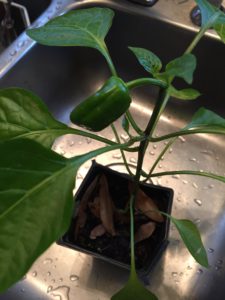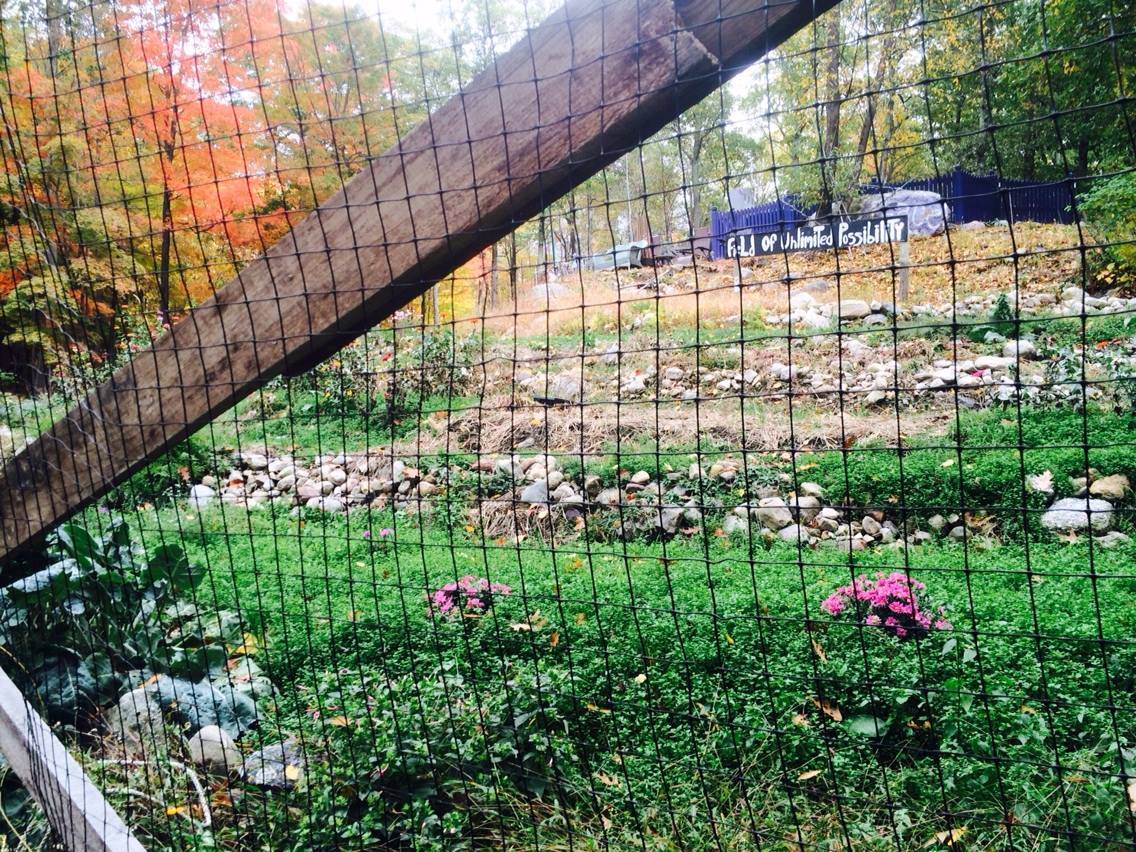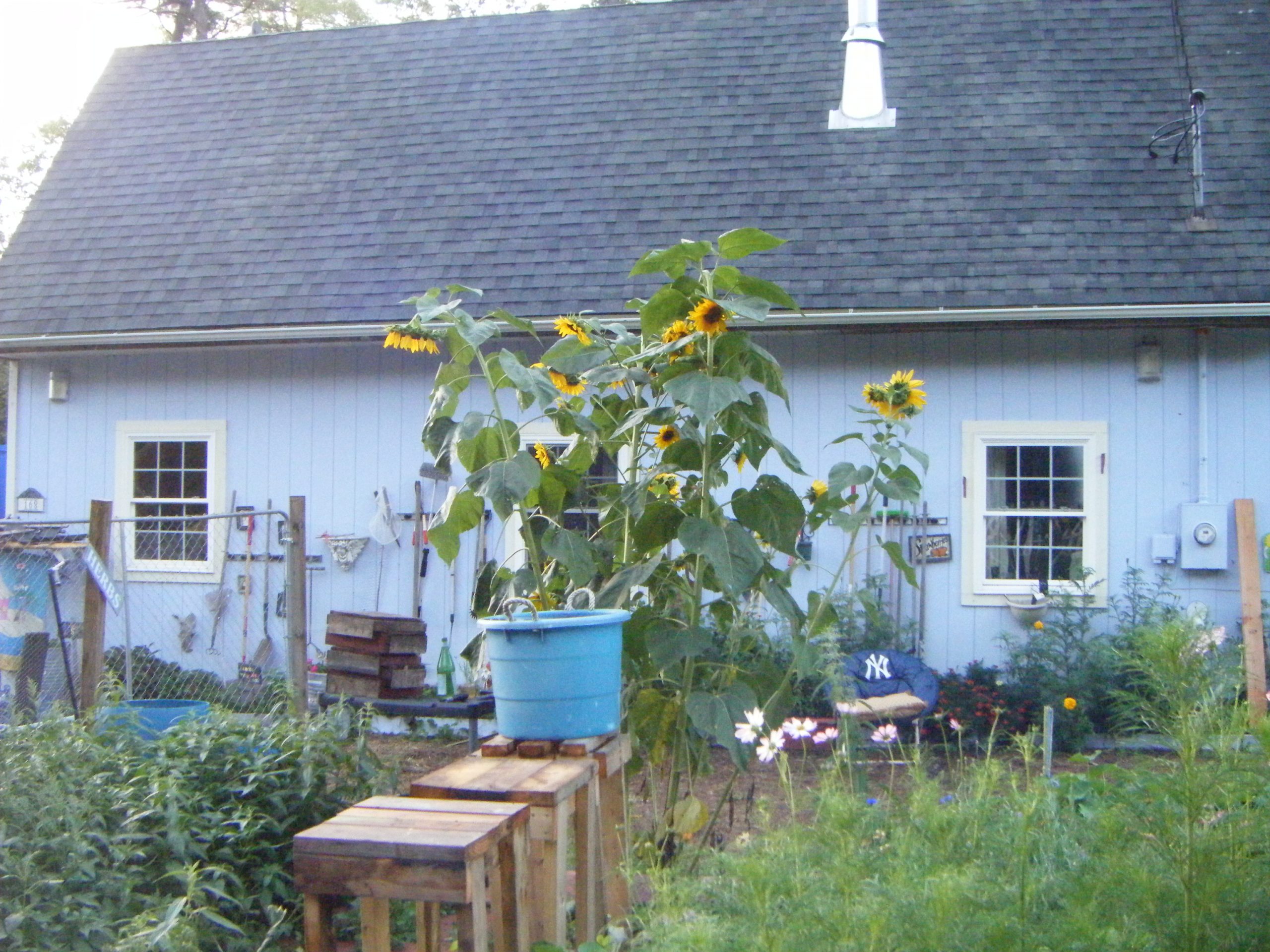For me, gardening has to be “no fuss”. It has to almost run on auto pilot once it’s set up.
Making your growing project convenient. Besides an area that has good sun & water source, make sure where you grow your plants is easy for you to access. Growing right outside of your front or back door is a good idea instead of having to walk all the way to the “back forty” to get to it. Growing food works best if it can easily be part of your normal daily routine. (Though I have gardens in public places, that don’t need daily visits because I grow more perennial drought tolerant plants there and I normally drive that way in my weekly routine making it easy to maintain).
Water source and watering system needs to be handy and easy to use. I can’t stand to fight with kinking hoses and I need a good shower nozzle that is not going to break tomorrow because it’s just made of plastic! For smaller projects, I also prefer to use rain collection (instead of chlorinated water) by using an open top 55 gallon rain barrel (with removable screen) because I can just dunk my water can into it. (Works faster than the spigot at the bottom 🙂
Companion plant with herbs can increase yields, attract beneficial insects, and help nurture diversity for balance.
Companion and inter-plant herbs right along with your vegetables. For instance, plant cabbage, kale, broccoli and other bassicas with dill, which attracts predatory wasps.
Predatory wasps are just one example of the how a healthy garden balances itself. Here is just a little about how that works.
Trichogrammatids, scelionids and mymarids are no bigger than the period at the end of this sentence. They help control caterpillars such as cabbage loopers and cabbageworms.
Eulophids parasitic wasps that are usually metallic green or blue in color. Some types help control Colorado potato beetles by parasitizing their eggs, while others parasitize the adult insects.
Pteromalids are about one-eighth inch long and solid black with distinctive red eyes. Female pteromalids parasitize pupating caterpillars and beetle larvae by laying eggs inside them.
Interesting stuff, huh?…
Dill planted with brassicas is just one of the many beneficial relationships you can encourage in your garden. Google companion planting for more.
All compost is not created equal.
It is smart to recycle our vegetable scrapes, coffee grounds and tea bags. You can make a compost pile and make you’re own soil for your garden. I add some Microbemakers Compost Tea in a Box to mine so that it would jump start the process with more microbes. Even though I use compost that I make, it is never enough or as effective as the compost tea. This stuff is amazing and perfect for people who cannot have a compost pile. I use it to feed my garden plots and it takes all the guesswork out of balancing my soil nutrition because the microbes know just what to do! Saves me sooo much time, energy and $$. I have never had a product I could recommend until now.
Check out the Facebook live video with Evan Folds speaking at Fayetteville State University. Evan Folds at Fayetteville State University- FB LIVE
Mulch
Mulch is one of my best friends! It invites more organisms, help hold moisture (I spend less time watering), is a natural, slow release fertilizer, encourages the beneficial mycelium network that draws up nutrients from deeper in the soil and makes it available to the plants and suppresses any competing weed growth. (though I allow some weeds in my garden because I eat them they do important work as well.
Straw, or wood chips for mulch are two of my favorites, but I have lots of leaves available and I use those too. It’s important to me to always keep the soil covered. I will just rake the mulch back before I turn the soil, if needed, and then plant. It’s important to be careful not to till the mulch into the soil. Then when the plants are up, I move the mulch back to cover.
Watering plants before a frost.
If frost threatens water the ground well the day before. Plants are less susceptible to frost damage if they are well watered.
My biggest tip of all is this: Use Microbemakers Compost Tea in a Box. Before I used this, I was always trying a whole bag full of tricks to discourage pests, mildew and other problems…a lot of time spent with little results. It all sounded good, but my approach was all wrong! Now I know that I just need to bring in the microbes! (they are my superheroes!) I just feed them and they bring in the balance of what is needed in the soil to prevent issues. Growing healthy soil is my first priority and it’s sooo easy to do! Now I don’t spend gobs of time reading what to do about this or that isolated problem! Thank you Evan Folds!
I overwintered some pepper plants and here is a picture of one in a 4 inch pot with a tiny pepper that is growing faster than anything I have ever witnessed before! I had to bring it in last night, March 12, because it snowed here in Fayetteville 🙂

Boy, I just can’t tell you how good it feels to be able to grow this way! Working with nature is the only way to do this. Start working with this microbe food and you will get really excited like everyone who tries it!

